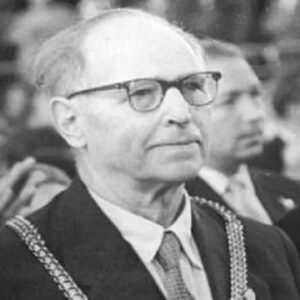Max Volmer was a German chemist who specialized in physical chemistry. His work on the Butler-Volmer equation is credited with laying the groundwork for phenomenological kinetic electrochemistry. He began his studies at Marburg’s Phillips University and later transferred to Leipzig’s University of Leipzig, where he earned his doctorate. He taught at Leipzig University and was promoted to Privatdozent within two years of taking up the position. He conducted military-related research at the Friedrich-Wilhelms University’s Physical Chemistry Institute and also worked in the research division of a well-known German industrial firm called Auergesellschaft. Subsequently, he collaborated with Otto Stern to build the mercury steam ejector and co-authored a paper with him that resulted in the attribution of the Stern–Volmer equation and constant. He taught at several of Germany’s most prestigious educational institutions, including the University of Hamburg and Technische Hochschule Berlin. From 1945 to 1955, he worked as a researcher in Russia, assisting the country with numerous research programs. He was later honored by the Russians with an award. After returning to East Germany, he taught at Berlin’s Humboldt University.
Childhood & Adolescence
Max Volmer was born in Hilden, North Rhine Westphalia, Germany on May 3, 1885. He enrolled in 1905 at Marburg’s Phillips University and graduated three years later with a bachelor’s degree.
He then attended the University of Leipzig, where he earned a doctorate in 1910. His doctoral dissertation focused on photochemical reactions in extreme vacuums.
Career of Max
He was appointed as an assistant lecturer at the same university in 1912 after receiving his doctorate from the University of Leipzig. He completed his Habilitation the following year and was appointed Privatdozent at the University.
In 1916, he joined the Friedrich-Wilhelms University’s Physical Chemistry Institute and worked on military-related research. In 1918, he joined the research division of the industrial firm Aurgesellschaft in Berlin, where he worked for two years.
In 1919, he collaborated with Otto Stern to develop the mercury steam ejector. As a result, he and Stern co-authored a paper that established the Stern–Volmer equation and constant. The following year, he was appointed extraordinarius professor of electrochemistry and physical chemistry at the University of Hamburg.
Max Volner was appointed ordinarius professor and director of the Technische Hochschule Berlin’s Physical Chemistry and Electrochemistry Institute in 1922. He discovered the phenomenon of Volmer diffusion, which involved the migration of absorbed molecules, while he was a student at the Technische Hochschule Berlin.
In 1930, he expanded on John Alfred Valentine Butler’s work to create the Butler-Volmer equation, which spawned a new branch of science known as phenomenological kinetic electrochemistry.
Volmer, along with three others, moved to Russia as part of a pact among some of Germany’s leading scientists at the time to protect scientific institutions and themselves from persecution by the Nazis. He spent a decade in Russia, beginning in 1945, and one of his most significant projects during this time period was his work on the production of heavy water. He also worked on a plutonium extraction project.
On 1 May 1955, upon his return to East Germany, he was appointed ordinaries professor at the Humboldt University of Berlin. On 10 November of the same year, he was appointed to the GDR’s Council of Ministers.
On 8 December 1955, he was elected president of the German Academy of Science, a position he held until 1959. In 1957, he was elected as the first member of the GDR’s Forschungsrat.
Significant Works of Max
His most significant contribution to science during his lengthy career is without a doubt his work on the Butler-Volmer equation, which he produced in 1930 after reviewing Butler’s work. It established the theoretical underpinnings of phenomenological kinetic electrochemistry.
Awards and Accomplishments
Max Volmer received the Soviet Union’s Outstanding Scientist of the People award in recognition of his decade-long work in the country from 1945 to 1955.
Personal History and Legacies
Max Volmer married Lotte Pusch, a professional physical chemist. He died in Postdam on June 3, 1965, at the age of 80.
The Max Volmer Laboratory for Biophysical Chemistry was named in his honor at the Technical University of Berlin.
Estimated Net Worth
Max Volmer net worth is unknown.


